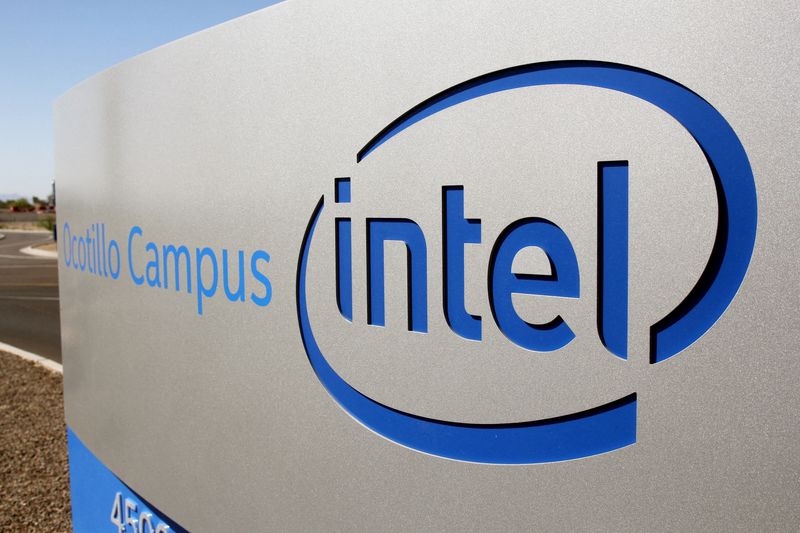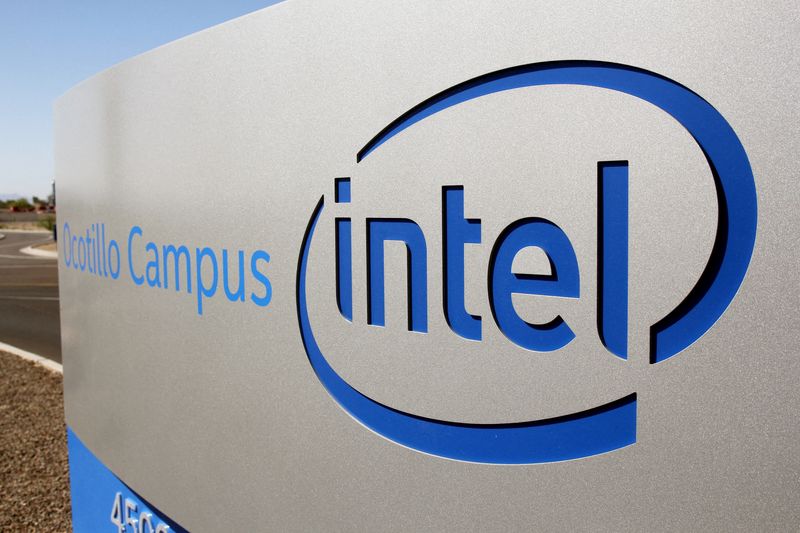Stock Markets
Intel signs Microsoft as foundry customer, says on track to overtake TSMC


© Reuters. FILE PHOTO: The logo for the Intel Corporation is seen on a sign outside the Fab 42 microprocessor manufacturing site in Chandler, Arizona, U.S., October 2, 2020. REUTERS/Nathan Frandino//File Photo
By Stephen Nellis and Max A. Cherney
(Reuters) -Intel said on Wednesday that Microsoft (NASDAQ:) plans to use its services to manufacture a custom computing chip and that the company expects to beat an internal deadline of 2025 to overtake its biggest rival, Taiwan Semiconductor Manufacturing Co, in advanced chip manufacturing.
The chipmaker also gave new details on how it plans to maintain a lead over TSMC into 2026 and beyond.
Intel (NASDAQ:) made the disclosures at an event in San Jose, California, at the first technology conference for Intel Foundry, the contract manufacturing operation it established to compete with TSMC.
Intel says it plans to retake the mantle of making the world’s fastest chips from TSMC later this year with what it calls Intel 18A manufacturing technology and extend that lead into 2026 with new technology called Intel 14A.
It said Microsoft will use its 18A technology to make an undisclosed chip and that it now expects $15 billion of foundry orders, up from the $10 billion that the company had earlier told investors to expect.
The news of 14A technology is the first time that the Silicon Valley company has given details of its plans beyond the 2025. That is the deadline that Intel’s CEO, Pat Gelsinger, had set to regain the chipmaking crown when he took the reins three years ago.
For decades, Intel made chips only for itself and used its lead in manufacturing to create a cycle in which it made chips with industry-leading performance and charged a premium for them. Those margins, in turn, helped fund manufacturing advances. But when Intel lost its manufacturing lead, its chips became less competitive and margins slipped, sapping the source funding for a manufacturing rebound.
Now, Intel is counting on potentially billions of dollars in U.S. government subsidies and business from outside customers to help it get back on track.
It is hoping some customers will be enticed by its long history of operating cutting-edge factories on multiple continents, especially those with concerns about TSMC’s practice of keeping its most advanced factories clustered in Taiwan.
“It’s a sales pitch that’s resonating right now. People want that,” Stu Pann, the executive overseeing Intel Foundry, said of the company’s geographic diversity.
Intel says it has four “large” customers signed up for its 18A manufacturing technology but has yet to name them.
Intel also has a special technology that analysts say will be useful for speeding up power-hungry artificial intelligence chips. Nvidia (NASDAQ:), the leader in the AI chip market, has said it is evaluating Intel’s manufacturing technology, but the two companies have not announced a deal.
Intel’s effort to lure in outside customers “is the key to the turnaround story,” said Ben Bajarin, chief executive of consulting firm Creative Strategies.
“Unfortunately, it’s an unanswered question, because this is a two-to-three-year journey before we have any inkling of knowing that this is working.”
Stock Markets
Suburban Propane director Logan sells $139k in shares
Stock Markets
Stock market today: S&P 500 closes lower, but posts big weekly win
Stock Markets
TD Bank promotes Laura Nitti to retail market president role

 Forex3 years ago
Forex3 years agoForex Today: the dollar is gaining strength amid gloomy sentiment at the start of the Fed’s week

 Forex3 years ago
Forex3 years agoUnbiased review of Pocket Option broker

 Forex3 years ago
Forex3 years agoDollar to pound sterling exchange rate today: Pound plummeted to its lowest since 1985

 Forex3 years ago
Forex3 years agoHow is the Australian dollar doing today?

 Cryptocurrency3 years ago
Cryptocurrency3 years agoWhat happened in the crypto market – current events today

 World3 years ago
World3 years agoWhy are modern video games an art form?

 Commodities3 years ago
Commodities3 years agoCopper continues to fall in price on expectations of lower demand in China

 Economy3 years ago
Economy3 years agoCrude oil tankers double in price due to EU anti-Russian sanctions





















